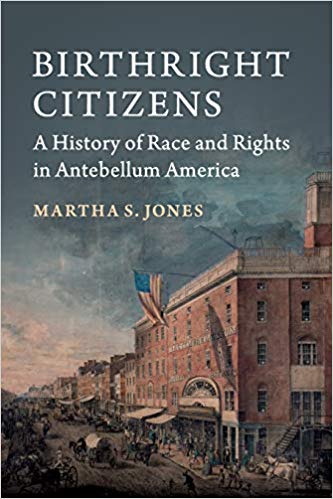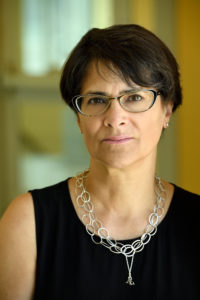Editor's Note
This is the second of two interviews with S-USIH keynote speakers. Martha S. Jones is Society of Black Alumni Presidential Professor and Professor of History at Johns Hopkins University. Dr. Jones is author of All Bound Up: The Woman Question in African American Public Culture, 1830-1900 (University of North Carolina Press, 2007) and Birthright Citizenship: A History of Race and Rights in Antebellum America (Cambridge University Press, 2018). She is also co-editor of Toward an Intellectual History of Black Women (University of North Carolina Press, 2015).
Our previous interview with the other S-USIH 2019 keynote speaker, Claire Potter, can be found here.
1) How has your current institution, Johns Hopkins University, shaped your teaching and scholarship approach?
The Hopkins Seminar, an every Monday afternoon discussion of works-in-progress, ensures that I start each week stretching my thinking as a historian. It had been too easy to read only in my own fields. But now, when a guest presents on a topic that is new to me, I feel like a graduate student again as I happily scramble to read the paper and know just enough about the topic to engage with it. We’re encouraged in our undergraduate teaching to use experiential, research and problem based approaches. This has permitted me to indulge in my favorite sorts of classes, ones in which students produce new resources for people beyond the classroom. They have even read and critiqued my book manuscript, in progress! I’ve become accustomed to regarding students as collaborators and co-learners and this in turns fuels my own research and writing.
2) Both of your books, Birthright Citizens and before it All Bound Up Together, tackle 19th century African American history. Why do you think both stories are essential to modern African American politics and culture?
I have to say up front that I consider the 19th century to be within the bounds of modern history, a perspective that grows out of my long time associations with historians of Africa and the Diaspora. Beyond periodization, my work is forward looking in that it subtly anticipates the long black freedom struggle, the story of black Americans in building an American democracy, and is often invoked to explain, contextualize, and otherwise navigate questions of our own time – including matters of citizenship and women’s rights.
3) When Birthright Citizens was released in 2018, its launch coincided with a re-ignited public debate about birthright citizenship and the Fourteenth Amendment. How did you envision your book contributing to public discourse about civil and political rights?
I always believed that the story I tell in Birthright Citizens would contribute to public discourse, but I never anticipated how much. In legal culture today we are still puzzling over how precisely it was that racism became so hard-baked into the work of lawmakers. Birthright Citizens was  intended to tell an early chapter in the story of how white supremacy came to be nearly inextricable from lawmaking in the early US. Published in 2018, amidst a legal and humanitarian crisis that turns in part on our ideas about citizenship gave the book additional relevance. It has been very meaningful to share the story of how 19th century black Americans struggled to establish their right to belong, even in the face of threats to remove them from the US. It is not a blue print, but it is evidence that there is too little that is new in our own time as lawmakers fail to provide Americans either predictability or finality when it comes to their status.
intended to tell an early chapter in the story of how white supremacy came to be nearly inextricable from lawmaking in the early US. Published in 2018, amidst a legal and humanitarian crisis that turns in part on our ideas about citizenship gave the book additional relevance. It has been very meaningful to share the story of how 19th century black Americans struggled to establish their right to belong, even in the face of threats to remove them from the US. It is not a blue print, but it is evidence that there is too little that is new in our own time as lawmakers fail to provide Americans either predictability or finality when it comes to their status.
4) Do you identify as a scholar of US Intellectual History? How do you view this sub-field within the larger field of history?
I was reluctant to claim this label until I worked with the Black Women’s Intellectual and Cultural History Collective on an edited volume titled Toward an Intellectual History of Black Women, which was published in 2015. I worked alongside some formidable intellectual historians, including my co-editor Mia Bay. I also spent time developing a more capacious idea of who intellectuals are and have been. I still prefer to say I write the history of ideas, which is my way signaling to readers that I’m hoping to expand their thinking about what intellectual history is. But most days, I’m likely to simply say I’m a historian. I’d hate to box myself in!
5) What, in your opinion, is the role of historians in public discourse?
I am most comfortable staying close to my areas of expertise when I write or speak for public audiences. This is not to say that I avoid having opinions, but my reasoning is nearly always rooted in my research and overall understandings of the past. I was trained by Eric Foner who modeled for his students how we can take history anywhere and everywhere that audiences will have us. I work in this way. So for me the public might mean the Washington Post or an NPR segment. But it also means speaking with students at Baltimore’s School for the Arts, the members of the city Bar Library, or a book club at my local library. I think a lot about how I am also a citizen – and so you may see me stepping away from my professional identity from time to time, writing and speaking about those things that matter to me as a member of our body politic and of a human community.
6) How has the tradition of African American women participating in debates around race and gender influenced your own experience as a publicly engaged scholar?
With everything I write, I have my foremothers in mind. They sit on my shoulders most days, urging me forward. And while they are long gone from Earth, their spirits are with me. Much of my work aims to understand better the worlds they came up in. I was raised by black women who did not feel themselves limited by sexism. Of course they were, but they did not internalize the sorts of limits that others might have hoped to impose upon their professional and political aspirations. Only when I became a historian did this begin to look to me like a puzzle, and my first book was very much an effort to uncover the debates that produced my foremothers as activists and leaders. In my own life, I have been very fortunate to be associated with colleagues in the Association of Black Women Historians and the Berkshire Conference of Women Historians where we continue to work through those long-standing traditions of inquiry and debate.
book was very much an effort to uncover the debates that produced my foremothers as activists and leaders. In my own life, I have been very fortunate to be associated with colleagues in the Association of Black Women Historians and the Berkshire Conference of Women Historians where we continue to work through those long-standing traditions of inquiry and debate.
7) For the doctoral students at our conference, what advice can you share regarding the dissertation, and what was your own dissertation process like?
I wrote my dissertation alongside three colleagues who were also finishing up. I feel my debt to them until today! We instituted a boot camp as we were finishing up – long days together in the library writing. I was the last one left writing as others peeled off to start jobs and such. I continued to write in the library where the quiet bustle helped me stay focused. Even today, I head to a good coffee shop when my discipline fails and invariably, as I shut out other people’s conversations, I find my focus and the words come. That is to say that I learned strategies while writing my dissertation that serve me well today. We had a name for our group: The Donner Party. Our hope was that everyone would make it to the end. But our pact was that if one of us should perish, the survivors were at liberty to do what they needed to make it. (I probably don’t have to tell your readers what that means in Donner Party terms.) We still show up for one another even today. And that’s the other lesson: Don’t just make friends in graduate school, make the sorts of friends who are friends for life.
8) What are you looking forward to most at USIH 2019?
That’s a tough. I’d say it’s a toss up between Claire Potter’s keynote and the conversation with Ally Sheedy. And I admit that when I learned that I was on the same program as Ms. Sheedy I wondered if there hadn’t been some sort of mistake. No worries though, I promise not to fan-girl too much.

One Thought on this Post
S-USIH Comment Policy
We ask that those who participate in the discussions generated in the Comments section do so with the same decorum as they would in any other academic setting or context. Since the USIH bloggers write under our real names, we would prefer that our commenters also identify themselves by their real name. As our primary goal is to stimulate and engage in fruitful and productive discussion, ad hominem attacks (personal or professional), unnecessary insults, and/or mean-spiritedness have no place in the USIH Blog’s Comments section. Therefore, we reserve the right to remove any comments that contain any of the above and/or are not intended to further the discussion of the topic of the post. We welcome suggestions for corrections to any of our posts. As the official blog of the Society of US Intellectual History, we hope to foster a diverse community of scholars and readers who engage with one another in discussions of US intellectual history, broadly understood.
Thanks for this—to both Martha and Robert! Loved the answer to #4. And of course I appreciate Martha’s view of the LONG twentieth century—meaning that it stretches back to Reconstruction. – TL